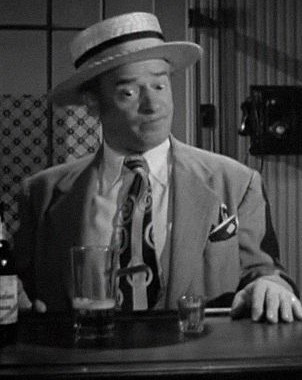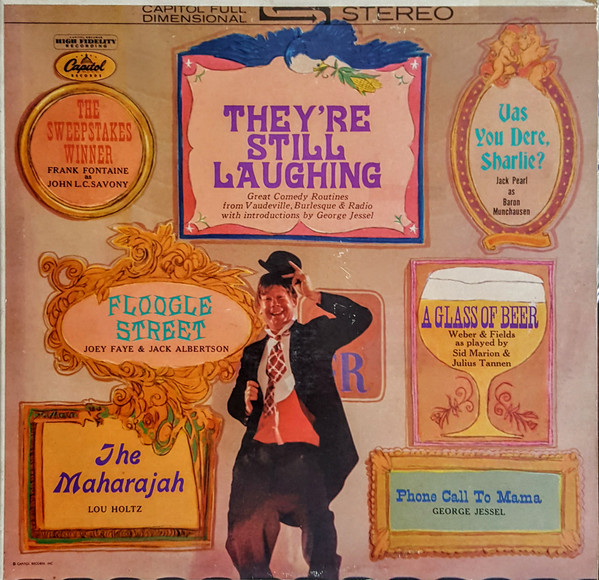Sid Marion, sometimes billed as Sidney Marion (Sidney Marienberg, 1900-1965), was a performer about whom we know little on the private end, but a good deal professionally. Born in Massachusetts, he was a comedian in vaudeville who also possessed some sideshow skills. He later worked in Broadway shows and was a character actor in movies.
Joe Laurie Jr (in his book Vaudeville) tells of Marion being in a two act with Marion Ford, and also reports of him doing a solo in the last four-a-day bill at the Palace in 1932. According to Anthony Slide, Nick Lucas, who appeared with him on that bill, spoke very highly of him as a comedian. He may or may not, be the same Sidney Marion in the Broadway show You Know Me Al (1918) presented as a WWI entertainment by a U.S. army unit, or the 1919 silent movie The Winning Stroke (1919) with George Walsh. Both of those credits seem a bit anomalous, in light of how he broke into films in the talkie era. In The Mighty Barnum (1934) and Magnificent Obsession (1935) he played SWORD SWALLOWERS, a job that meant that he lierally swallowed swords on camera, which implies strongly that he had a bit of the circus or the sideshow in his background. In 1937 he performed in an independent variety short entitled Rhythm in a Night Court with Al Bernie, Harry Rose, Jean Parrillo, and an acrobatic troupe called Sylvia Manon and Company. Then (1939-40) he toured with the Olsen and Johnson show The Streets of Paris which included one of the most incredible casts you’ve heard of: Bobby Clark (newly single after the suicide of Paul McCullough), a then unknown Carmen Miranda, a then new Abbott and Costello, Luella Gear, the Hilton Sisters, Gower and Jeanne, Margaret Irving, and others.
During World War Two, Marion toured with the U.S.O., in a show that also featured Cliff Hall of the Baron Munchausen radio program (who’d also been in The Streets of Paris). In 1943 came one of his better known movie roles, as a third banana comedian in Lady of Burlesque. From here he worked pretty steadily as a character actor in movies. He’s in How DOooo You Do? (1945) withe Mad Russian Bert Gordon and Harry Von Zell, a couple of the Jiggs and Maggie comedies; the George Jessel musicals Oh You Beautiful Doll (1949) and The I Don’t Care Girl (1953), the noir film Quicksand (1950) starring Mickey Rooney (amusingly in light of its star, Marion plays a guy named “Shorty”), Call Me Madam (1953), Money from Home (1953) a 3-D movie with Dean Martin and Jerry Lewis, Beau James (1957) with Bob Hope, I Married a Woman (1958) with George Gobel, The Five Pennies (1959) with Danny Kaye, My Fair Lady (1964), and The Outlaws is Coming (1965) with the Three Stooges.
On TV in the ’50s he also appeared on variety programs like the All Star Revue and the Colgate Comedy Hour. He returned to Broadway in 1955 for the musical Plain and Fancy.
Yet, all those credits notwithstanding, Marion’s most important legacy may have been in another medium entirely:
In 1961, nostalgia merchant George Jessel produced a record album for old folks and their nerdy grandchildren preserving several of the great comedy routines of vaudeville and burlesque, delivered by many of the comedians who’d done them to great acclaim decades earlier. It naturally featured his own “Phone Call to Mama” bit. Marion and Julius Tannen played Weber and Fields in the bit about the Glass of Beer (a routine that had been dusted off and reinvented by Laurel and Hardy in a couple of their movies. Also on the bill were Joey Faye and Jack Albertson doing burlesque sketch classic “Floogle Street”, Lou Holtz, and Frankie Fontaine of The Jack Benny Program and The Jackie Gleason Show (his “partner”, John L.C. Savony, was actually also Fontaine, doing a character).
You thought it was hyperbole when I said he worked with everybody, right? He’s practically vaudeville comedy’s Forest Gump. Marion may have flown a bit under the radar as far as being a “star” was concerned, but as a comedy supporting player he was right in the thick of the fray. Lord, he must have had an ocean of comedy knowledge in his head.
For more on vaudeville, please see No Applause, Just Throw Money: The Book That Made Vaudeville Famous, and for more on classic comedy read Chain of Fools: Silent Comedy and Its Legacies from Nickelodeons to Youtube.



You must be logged in to post a comment.